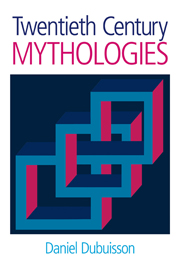Book contents
- Frontmatter
- Epigraph
- Contents
- Foreword by Professor Robert A. Segal
- Preface
- Abbreviations
- Introduction: History and comparative epistemology
- Part I Georges Dumézil, or Society
- 1 The Indo-European background
- 2 The first comparative mythologies
- 3 Durkheim, Mauss, Bourdieu, and Dumézil
- 4 The 1950s: a reorientation
- 5 Comparative and structural evidence
- 6 The new comparative mythology
- Addendum I Theory, history, and the limits of Dumézil's comparativism
- Addendum II Does a Dumézilian theory of religion exist?
- Part II Claude Lévi-Strauss, or the Mind
- Part III Mircea Eliade, or the Sacred
- Conclusion: Modern theories of myth and the history of Western thought
- Bibliography
- Index
6 - The new comparative mythology
from Part I - Georges Dumézil, or Society
- Frontmatter
- Epigraph
- Contents
- Foreword by Professor Robert A. Segal
- Preface
- Abbreviations
- Introduction: History and comparative epistemology
- Part I Georges Dumézil, or Society
- 1 The Indo-European background
- 2 The first comparative mythologies
- 3 Durkheim, Mauss, Bourdieu, and Dumézil
- 4 The 1950s: a reorientation
- 5 Comparative and structural evidence
- 6 The new comparative mythology
- Addendum I Theory, history, and the limits of Dumézil's comparativism
- Addendum II Does a Dumézilian theory of religion exist?
- Part II Claude Lévi-Strauss, or the Mind
- Part III Mircea Eliade, or the Sacred
- Conclusion: Modern theories of myth and the history of Western thought
- Bibliography
- Index
Summary
The reader will have been more than a little surprised – whether familiar with contemporary mythological studies or not – by the infrequent use of the word “myth” in preceding chapters. Although unexpected, this absence only confirms, in its way, the puzzling phrase often cited by Dumézil, in which he admitted his incapacity to distinguish a tale from a myth. He never tried to propose a categorical definition of myth, or to isolate its particular essence (if such a thing ought to be sought), or, more simply, to characterize a vague mythic process. Nothing was more philosophical – and thus more useless, in his view – than such vain conceptual constructions, aimed at feeding the free play of speculation (and of prattle, he would no doubt have added). Dumézil's work does not take account of philosophical digressions and general considerations; and he himself always refused to disclose anything of his own worldview (which every reputable university scholar today feels obliged to do in all eager solemnity).
What did the “new comparative mythology” contribute, if myth was not defined or if the acceptance of the term did not include even a small degree of originality? How can it be said to have represented palpable progress in the domain of knowledge or our ways of thinking if indeed the object of its concern was treated more or less indifferently?
- Type
- Chapter
- Information
- Twentieth Century Mythologies , pp. 73 - 78Publisher: Acumen PublishingPrint publication year: 2006



